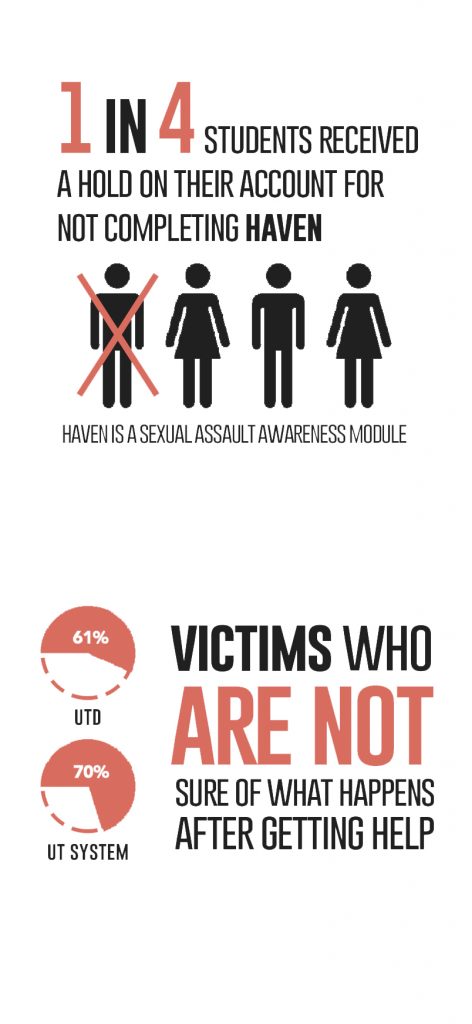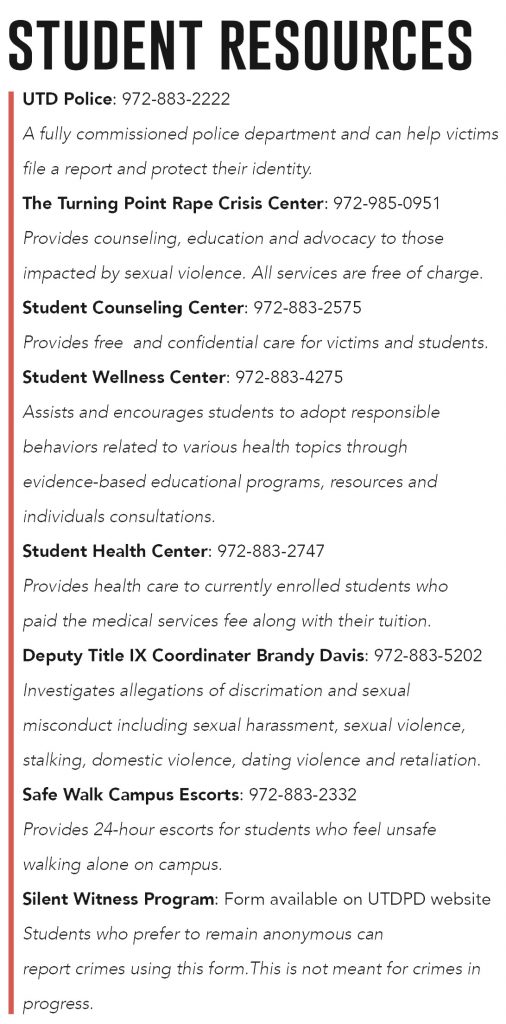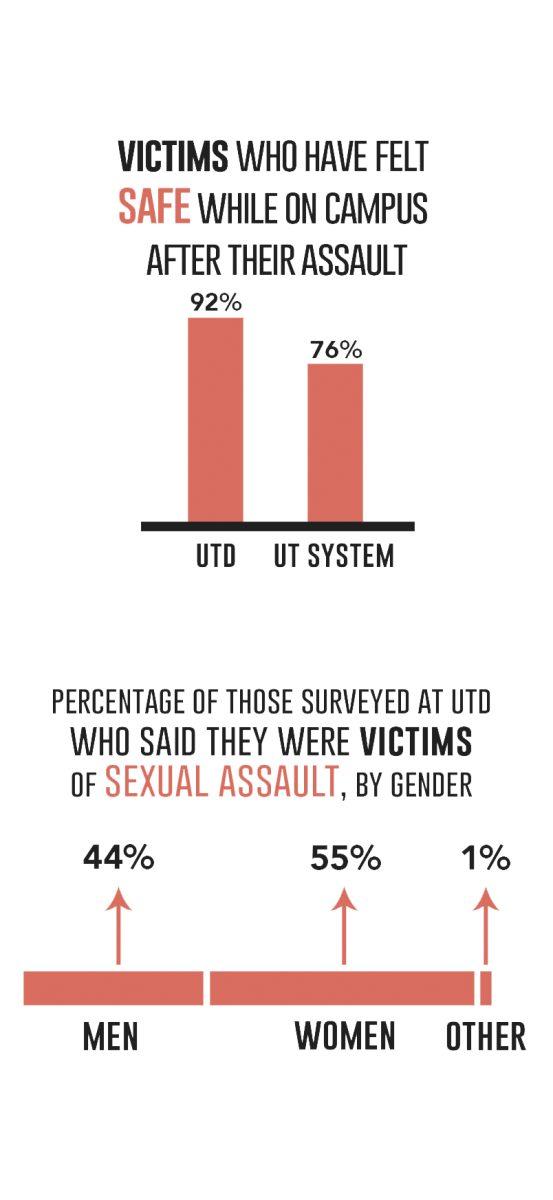A recent UT System-wide report on campus sexual assault prevention procedures found a low disclosure rate among victims at UTD and a lack of knowledge among students of the reporting process and resources available.
Since the release of the report, Cultivating Learning and Safe Environments, in March 2017 university officials rolled out a series of programs aimed at improving student perceptions of the school’s approach to sexual assault prevention. These include booklets detailing victim rights and resources, on-campus rape kits, updates to key websites and workshops to raise student awareness.
Lt. Ken Mackenzie said the police department is working to clear up misconceptions of the reporting process that can keep victims from disclosing. According to CLASE, 8 percent of victims at UTD disclosed to law enforcement, compared to the National Criminal Justice Reference Service’s report of 11.5 percent of college-age victims nationwide. Seventy-five percent of victims at UTD did not disclose to anyone. In response, UTD PD is making sure that victims know their rights and the resources available to them by providing a booklet containing various resources, including the Title IX office and Turning Point Rape Crisis Center in Dallas.
“A lot of people don’t want to report (an assault) because they’re afraid that their parents will find out about it,” Mackenzie said. “That’s not the case, we protect the person’s identity and will sometimes give them a pseudonym.”
Thirteen percent of students at UTD who took part in CLASE reported being sexually assaulted, in comparison to the 20 percent of college students nationwide, according to the Rape, Abuse and Incest National Network.

The Student Counseling Center is trying to increase disclosure rates and student knowledge of the reporting process. This will be done by providing Sexual Assault Nurse Examiners to perform rape kit exams as part of the Student Health Center’s services. The Counseling Center is working in conjunction with the Student Health Center, as well as Turning Point to provide the service, which could be available as early as next semester. Clinical psychologist at the Counseling Center Mallaree Blake said having nurses on campus can reduce victim trauma, which in turn allows the Counseling Center to help victims take back control after being assaulted.
“The most important thing for us is to get the power back into the victim’s hands,” Blake said. “We make sure that students know their options and that we believe them, that it’s not their fault.”
Victims can also contact the Title IX office to go over their legal options after being assaulted. According to the CLASE report, 48 percent of non-victims and 45 percent of victims don’t know or aren’t sure of where to get help after being assaulted. In response, the office updated its website to provide more information on filing a report and what to expect afterward.
“It’s really important to me to be as transparent and approachable as possible, because I see where other schools have gotten things wrong, and if I were a student that saw and read those things, I would be hesitant to come forward,” Blake said. “I try to make sure everybody knows how we do things here — we center on trying to make the victim know that they’re in control of their options and that we take these things very seriously.”
The Student Wellness Center also launched One Love — workshops focusing on dating violence awareness — as a direct result of CLASE report findings, Wellness Center Director Kacey Sebeniecher said. According to the report, 27 percent of UTD respondents experienced some form of dating violence or domestic abuse since their enrollment.
“The highest-occurring form of sexual misconduct among our student population in the CLASE report was domestic violence, so (One Love) is where we’re focusing our efforts right now,” Sebeniecher said. “We plan to expand our programming and make that piece of what we do even more substantial.”
Despite these moves to improve sexual assault prevention, one in four new students received a hold on their grades this fall for failing to complete Haven, an online sexual assault education service, according to EverFi, the company that owns Haven. Blake said that while a majority of these students eventually completed the modules, a lack of student education on sexual misconduct has made creating a dialogue difficult.

“This is part of the problem, students don’t really pay attention to the online modules, and a lot of the students that come (to the Counseling Center) actually don’t know that they’ve been sexually assaulted,” Blake said. “They struggle to define it, we lack the language and awareness around it.”
The report also states that males represent 54 percent of the student body, but only 44 percent of total victims. This reflects the national statistics from the American Association of University Women, showing that men are less likely than women to report sexual harassment or assault. UTD offers free Rape Aggression Defense (RAD) training for women once a month, but the men’s classes have been placed on hold as UTD police search for a new instructor. Mackenzie said even with the programs offered, there’s a discrepancy between male and female tendencies to sign up for the classes.
“The whole time that we had a trained instructor for the men’s classes, we didn’t have interest,” Mackenzie said. “We didn’t have enough (students) for a class, we have to have at least five or six.”
Molecular biology sophomore Mason Galliver was interested in taking the self-defense classes for men last year, but received an email from UTD PD saying that no classes were scheduled. Galliver said he was frustrated when the same thing happened this year, and would like to see UTD reach out to the male population by putting self-defense tips on UTD PD’s website instead of RAD for men. UTD PD currently offers crime awareness programs and crime prevention brochures to students upon request.
“I know that I’ll be fine without the class, I’m not interested because I feel like I need it,” Galliver said. “But I know that there are people out there that really want to take the class, and I feel like it’s a letdown on the school’s part because the class isn’t available to those people.”
The lack of a male presence in the self-defense classes is also reflected in the Student Counseling Center, as well as the Title IX office, where female victims outnumber males. Additionally, the report doesn’t mention the low disclosure rate among the male demographic in its key findings.
“I think that there’s a degree of stigma for male victims to come forward and report, which is something that we try to address,” Davis said, “The (complaints) that we deal with, they can absolutely happen to anyone.”
The SWC is currently trying to improve its strategies toward sexual assault prevention. The organization launched a series of programs focused around student action, including “It’s On Us” and “Take Back the Night” for nationwide sexual assault prevention, as well as “Comet Voice,” a bystander intervention program.
“Our aim is to offer programs that address every possible type of sexual misconduct that occurs,” Sebeniecher said. “We know that there are male and female aggressors on this campus, so our programs are very inclusive and have a neutral approach in terms of gender.”
Sebeniecher said it will be interesting to see if the implementation of new programs in response to the report, alongside pre-existing prevention programs such as Haven, will have any effect on students.
“We’re taking what we already do and adding the information from the report to expand our reach,” Sebeniecher said. “The CLASE study isn’t over, it might not be a huge statistical survey again, but for now we have our data and know where we need to improve.”

















